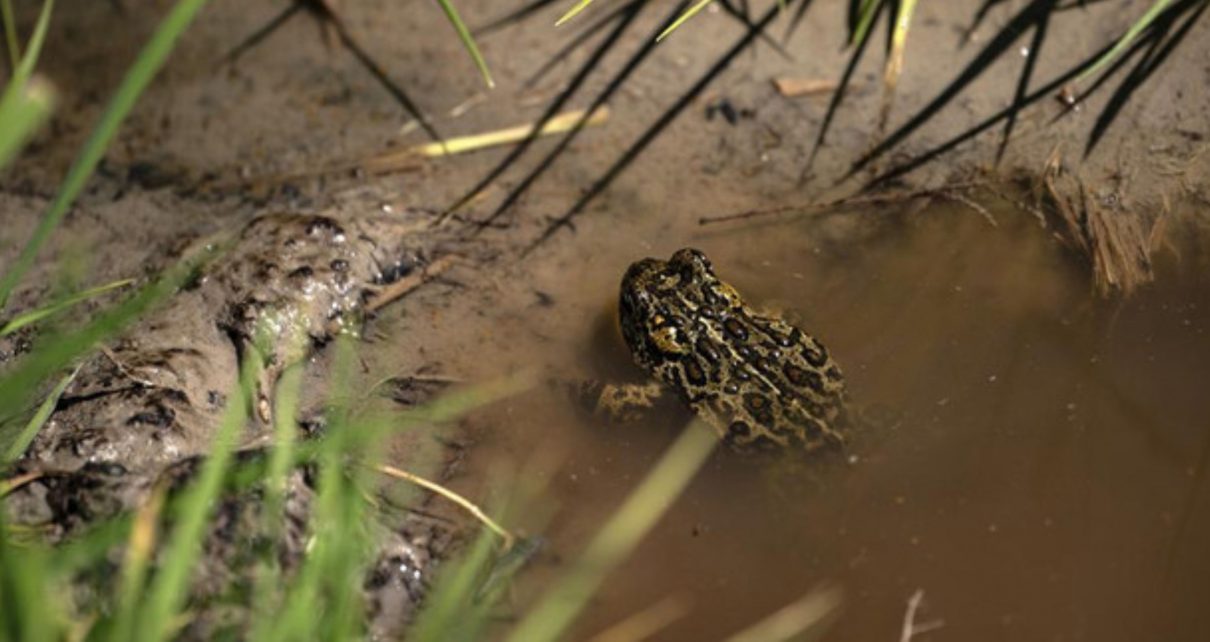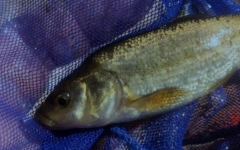
A Dixie Valley toad is observed in the Dixie Valley's hot spring-fed wetland near Fallon, Nevada, on Wednesday, May 4, 2022. In an extraordinary step in a court dispute involving a Nevada geothermal power plant and an endangered toad, the project's developer is now asking a judge to allow it to pull back by 80% the initial design approved by US land managers last November. (Salwan Georges/The Washington Post via AP)
Unusual Court Bid in the Fight to Save Endangered Nevada Toad
By TheNevadaGlobeStaff, November 3, 2022 9:00 am
RENO, Nev. (775 Times, NV Globe)- In an extraordinary step in a court dispute involving a Nevada geothermal power plant and an endangered toad, the project’s developer is now asking a judge to allow it to pull back by 80% the initial design approved by US land managers last November.
The US Bureau of Land Management and Ormat Technologies both filed motions to halt the lawsuit, citing the US Fish and Wildlife Service’s labeling of the Dixie Valley toad as endangered on a temporary, emergency basis in April.
“Significant factual developments have fundamentally changed the nature of this litigation,” government attorneys stated in a formal application to halt the case filed in federal court in Reno on Oct. 27.
Ormat joined the request in a document on Monday, noting that the “legal environment” had altered with the toad’s interim listing – something the agency has done just twice in the last 20 years on an emergency basis.
The toad dwells in marshes near the project, approximately 100 miles (160 kilometers) east of Reno. Environmentalists and a tribe opposing the project claim that pumping hot water from under the earth’s surface to create carbon-free power will harm surface water levels and temperatures, which are crucial to the survival of the toad and holy to the Fallon Paiute-Shoshone Tribe.
The company stated that it intends to abandon its initial plans for two power plants capable of producing 60MW of electricity in favor of constructing a single 12MW facility.
The Center for Biological Diversity, which petitioned for the designation and filed a lawsuit to stop the project, plans to fight the proposal. The formal response is due on November 9.
“What BLM is proposing would be extremely unusual,” the center’s Great Basin director, Patrick Donnelly, told The Associated Press. “Projects are usually evaluated on their own merits as standalone proposals, not carved up to meet the demands and timeframe of a developer.”
The case has previously been to the 9th U.S. Court of Appeals and was likely to revert to its previous legal route.
The San Francisco-based appeal court refused to block the project on August 1. Later that day, however, Ormat decided to halt work until January 1, 2023. The Reno-based corporation later decided to put all construction on hold until February.
Following the listing of the toad, the bureau was required to work with the Fish and Wildlife Service to verify that Ormat’s mitigation plan would not harm the toad or its habitat in violation of the Endangered Species Act.
“While the BLM and Ormat have always maintained that the … project and its (mitigation) plan are sufficient to avoid, minimize or mitigate impacts to the toad and its habitat regardless of the species’ listing status, the listing kicked off a mandatory and intensive consultation process with the service,” Ormat’s attorneys wrote Monday.
Ormat knows that under an updated decision record, building and operation of a smaller facility would be reliant on BLM’s compliance with the act, and that any later application to extend the project beyond the single power plant would require a separate review procedure, they stated.
The BLM stated in its Oct. 27 filing that it would speed examination of the amended plan and anticipate delivering a biological assessment of the proposal to the FWS by March 31, which suggested that it might evaluate whether the plan complies with the act by August 2023.
According to Donnelly, Ormat and the BLM effectively want the agency to approve the scaled-back version of the project before the necessary consultation is completed.
“We argue this is illegal — putting the cart before the horse, since they don’t know whether FWS will approve of the project or not,” he added. He stated that the group’s concerns would remain “even for a facility one-fifth the proposed size.”
According to Donnelly, the stay request indicates that “Ormat is desperate to avoid a judge ruling that geothermal energy is likely to impact adjacent surface water sources.”
“No judge has ever done so before,” he remarked. “The precedent would be huge — a watershed moment in the permitting of geothermal energy projects, where BLM would be forced to confront the reality head on, that geothermal energy is dangerous for hot spring ecosystems.”
Credits: Fox11
Copyright 2022 775 Times, NV Globe. All rights reserved.
- High Stakes in D.C.: Shutdown Averted, but DHS Funding remains in Limbo - January 30, 2026
- Saks Off 5th Launches Final Liquidation as Two Las Vegas Stores Prepare to Close - January 30, 2026
- Las Vegas Tourism Slows as Inflation, Crime, and High Costs Drive Visitors Away - January 30, 2026




